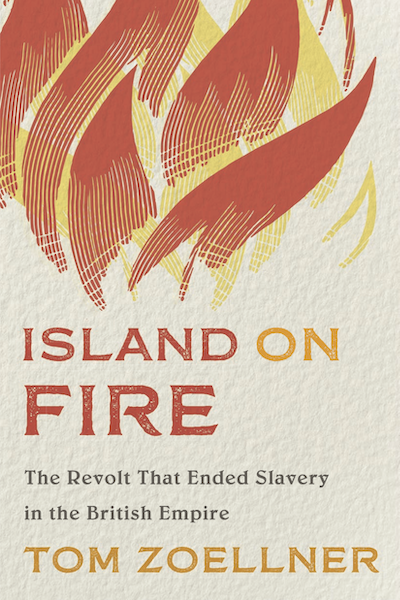 Island on Fire: The Revolt that Ended Slavery in the British Empire. A New York Times bestselling author’s gripping account of the slave rebellion that led to the abolition of slavery in the British Empire.
Island on Fire: The Revolt that Ended Slavery in the British Empire. A New York Times bestselling author’s gripping account of the slave rebellion that led to the abolition of slavery in the British Empire.
For five horrific weeks in 1831 – 1832, Jamaica was convulsed by an uprising of its enslaved people. What started as a peaceful labor strike quickly turned into a full-blown revolt, leaving hundreds of plantations in smoking ruins. By the time British put down the rebels, more than a thousand Jamaicans lay dead from on-the-spot executions and extrajudicial murder.
While the rebels lost their military gamble, their sacrifice accelerated the larger struggle for freedom in the British Empire. The daring and suffering of the Jamaicans galvanized public opinion, resulting in the decisive turn against slavery. For centuries cruel bondage had fed Britain’s lust for sugar. Within two years of the rebellion, slavery was abolished.
Island on Fire is the dramatic day-by-day account of this transformative uprising. A skillful storyteller, Tom Zoellner goes back to primary sources to tell the story of the men and women who tasted liberty for a few brief weeks. He memorably evokes the sights and sounds of the Caribbean in the 1830s; provides the first full portrait of its enigmatic leader Samuel Sharpe; and gives us a poignant glimpse of the dreams of the Jamaicans who died for liberty.
“Zoellner makes deft use of primary sources, and illustrates how the atmosphere of energetic political reform and events like Sharpe’s rebellion converged to end slavery in the ‘agricultural prison camp’ of Jamaica, and in the British Empire at large.” — The New Yorker
“Tom Zoellner is completely right that the 1831-32 revolt in Jamaica helped break the back of slavery in the British Empire. It’s high time that we had a book like the splendid one he has written: a highly readable but carefully documented account of the greatest of all British slave rebellions, the miseries that led to it, and the momentous changes it wrought.” — Adam Hochschild, author of King Leopold’s Ghost and Bury the Chains
“An engaging history of the horrific system of slavery practiced in Jamaica and the slave revolt that finally killed it. . . . Resurrecting this important historical episode, Zoellner moves nimbly through the research, giving an exciting account of the events as well as the significant consequences when the news reached England weeks later.” — Kirkus Reviews (starred review)
“A pounding narrative of events that led to the end of slavery in the British colonies . . . Zoellner’s vigorous, fast-paced account brings to life a varied gallery of participants black, white and ‘colored’— the then-standard designation for quasi-free people of mixed race.” — The Wall Street Journal
“Highlights the lives of the many Jamaicans who sacrificed their lives for freedom, putting it in the context of Britain’s passage of the Slavery Abolition Act of 1833. Impressively researched, this is a valuable addition to Jamaica’s documented history.” — Southern California News Group
“Tom Zoellner tells the story of Sam Sharpe’s revolution manqué, and the subsequent abolition of slavery in Jamaica, in a way that’s acutely relevant to the racial unrest of our own time. Island on Fire is impeccably researched and seductively readable.” — Madison Smartt Bell, author of All Souls’ Rising
“With vivid prose, Tom Zoellner captures the horrors of the brutal sugar plantations of Jamaica as well as that brief but transcendent moment when a group of enslaved people sought, against tremendous odds, to transform the island into a space of liberation. Island on Fire offers a haunting parable of how history is made and remade up to the present day.” — Karl Jacoby, author of Shadows at Dawn
“Island on Fire is a gripping account of the five weeks when Jamaica burned in a rebellion led by enslaved preacher Samuel Sharpe. Tom Zoellner recounts these dramatic events with great energy and detail, crucially setting Sharpe’s story—which until now has not been well known away from the island—in the wider context of the struggle for abolition on both sides of the Atlantic.” — Carrie Gibson, author of Empire’s Crossroads
“A riveting recounting of the causes and consequences of the war for emancipation led by Samuel Sharpe in Jamaica. Island on Fire catalogues in vivid detail the price that the freedom fighters paid for saying ‘no’ to continued enslavement against the backdrop of a growing antislavery movement on both sides of the Atlantic. It is a chilling reminder of colonial British brutality. One will need a strong stomach to read this moving account without shedding tears.” — Verene A. Shepherd, author of Livestock, Sugar and Slavery: Contested Terrain in Colonial Jamaica
On the night of December 27, 1831, a watchman standing on top of the courthouse in the Jamaican city of Montego Bay spotted a fire on a hillside south of town. Then another fire appeared close by. Then another.
The meaning of this chain of fire was instantly clear to the watchman, Col. George Lawson, who had been – like the rest of his militia unit – in a state of high tension for the previous week because of credible evidence that the slave population of the northwest shore of Jamaica was about to rise up in revolt.
Lawson rushed to report the fires to John Roby, the collector of customs at the port, who had almost certainly already seen the flames. As the Caribbean night sky gradually turned the color of copper, Roby wrote an urgent message to the governor of Jamaica. He underlined two words, a gesture almost never seen in official correspondence.
Sir, I consider it my duty to inform you that there is at this moment a serious fire raging in a southeasterly direction from this town, apparently 8 or 10 miles distant, and it is supposed at Hampton Estate but from the glare I fear it extends to other estates in its vicinity lying more to the southward. From the late insubordination of the negroes on many estates in the neighborhood, which has caused the militia to be under arms since Sunday last, it is feared that this fire is not from accidental causes and I beg the favor of your giving his Excellency the governor immediate information thereof.
He then added a postscript, knowing that one company of a badly-trained militia would not be sufficient to prevent the white population from being massacred.
½ past 9
I have just been informed that Kensington pen and Mr. Tullock’s settlement have been burned – we have one company of the 22nd regiment in this town
Lawson had no way of knowing if the family had been left alive or not. By the time ten o’clock arrived, he had counted at least six fires, and they seemed to blend into a terrifying orange crown on the hillbrows. By this point, he “feared the east part of the parish would be destroyed by morning.” If anything, this was an underestimation. Fires were breaking out all over northwestern Jamaica.

Tom Zoellner is the New York Times bestselling author of nine nonfiction books, including Uranium Train and The Heartless Stone. He teaches at Chapman University and Dartmouth College. A former reporter for the San Francisco Chronicle, he is the editor-at-large at the Los Angeles Review of Books.



